Z Academia's Approach to How Companies Should Deal with Reskilling
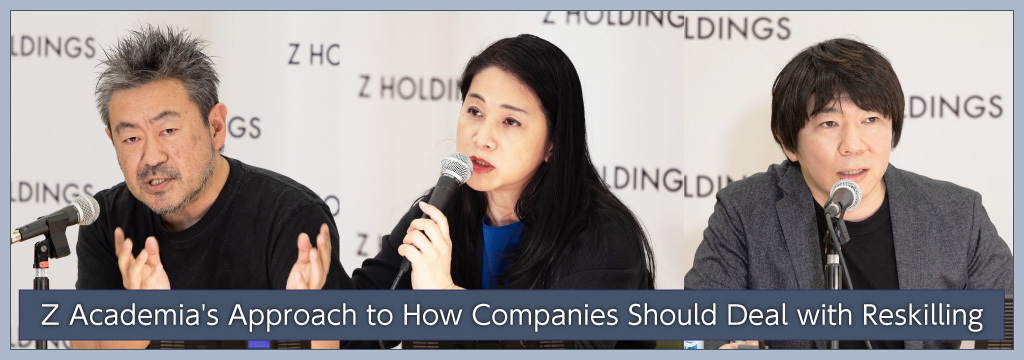
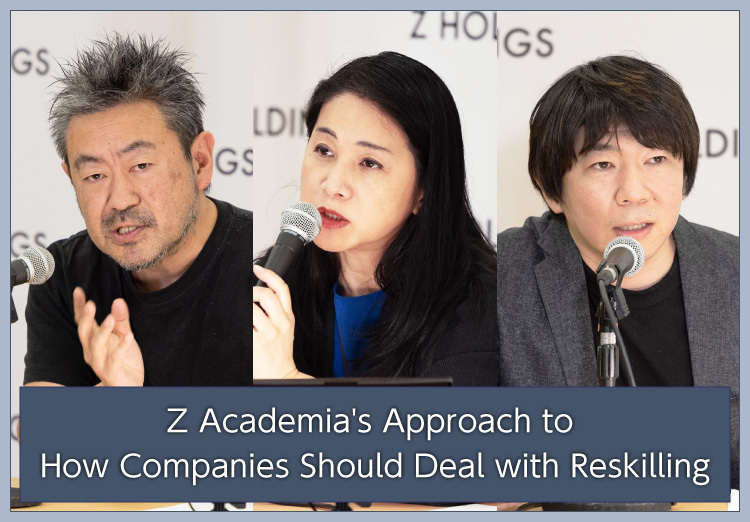
Z Academia, the in-house university of Z Holdings Corporation ("Z Holdings"), was established in April 2020. To fulfill its mission of "unleashing the talents and passions of the Group employees," Z AI Academia was subsequently founded in 2021 and Z Sustainability Academia in 2022, and approximately 200 courses are offered per year (FY2021).
Relearning among adults is drawing increasing attention, with the Japanese government announcing in October 2022 that it will invest JPY1 trillion over 5 years to support the reskilling of workers. What skills should be learned and how should they be applied to business? We invited Naoko Ishihara, who is engaged in research in the area of human resource management, along with Yoichi Ito, President of Z Academia, and Shinya Tabei, Director of Z AI Academia, one of the most popular AI human resource development courses in Z Academia. The three discussed the current trend of reskilling and Z Academia's efforts.
INDEX
PROFILE
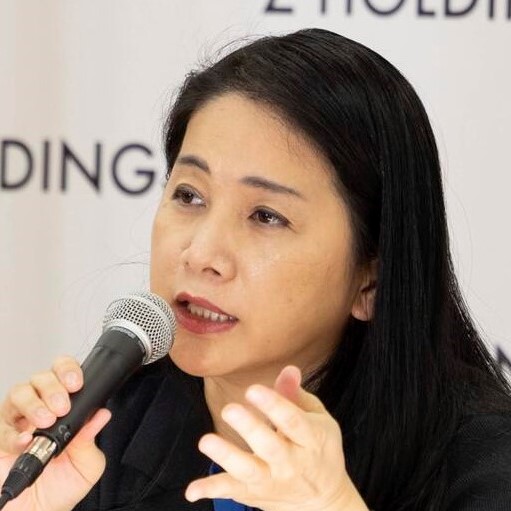
- Naoko Ishihara: Director of Hataraku AI & DX Laboratory, ExaWizards Inc.
- After working for a bank and a consulting company, Naoko Ishihara joined Recruit Works Institute in 2001. She served as editor- in- chief of the journal, "Works" and director of the Human Resources Research section. In April 2022, she moved to ExaWizards Inc., where she became Director of Hataraku AI & DX Laboratory. Her areas of expertise include talent management, diversity management, Japanese employment system, and organizational transformation.
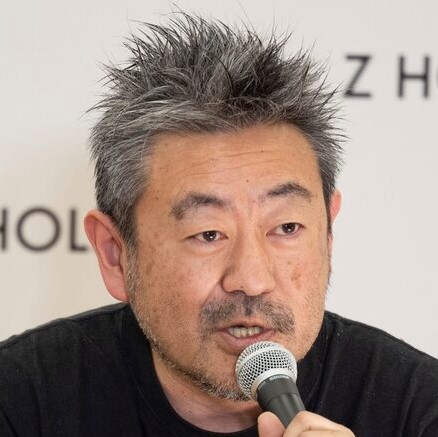
- Yoichi Ito: President of Z Academia, Z Holdings Corporation
- After working for The Industrial Bank of Japan and PLUS Corporation, Yoichi Ito has been with Yahoo Japan Corporation since 2015. Currently, as President of Z Academia, he develops next-generation leaders across the Z Holdings Group through Z AI Academia and Z Sustainability Academia. He also focuses on leader development as President of Weiwei Corporation and Visiting Professor at Graduate School of Management, Globis University, and in April 2021, he was appointed Dean of Department of Entrepreneurship Department at Musashino University (Musashino EMC).
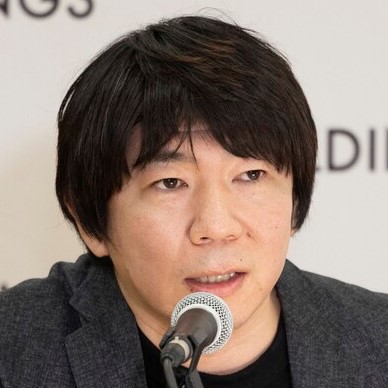
- Shinya Tabei: Director of Z AI Academia, Z Holdings Corporation
- After working for a game production company and a web production company, Shinya Tabei joined Yahoo Japan Corporation as a designer in 2006. He was involved in the development of several Yahoo! JAPAN services as a designer and manager of the design department. Concurrently serving in the personnel division, he was also involved in group training of newly graduated designers. From 2020, he has been directing Yahoo! JAPAN Academia with a main assignment in the personnel division. Currently, as director of Z Academia, he is involved in numerous programs offered to the entire Z Holdings Group, including Z AI Academia and Z Sustainability Academia.
Reskilling to Create Changes: Human Resource Strategies for Winning in the Digital Transformation Era
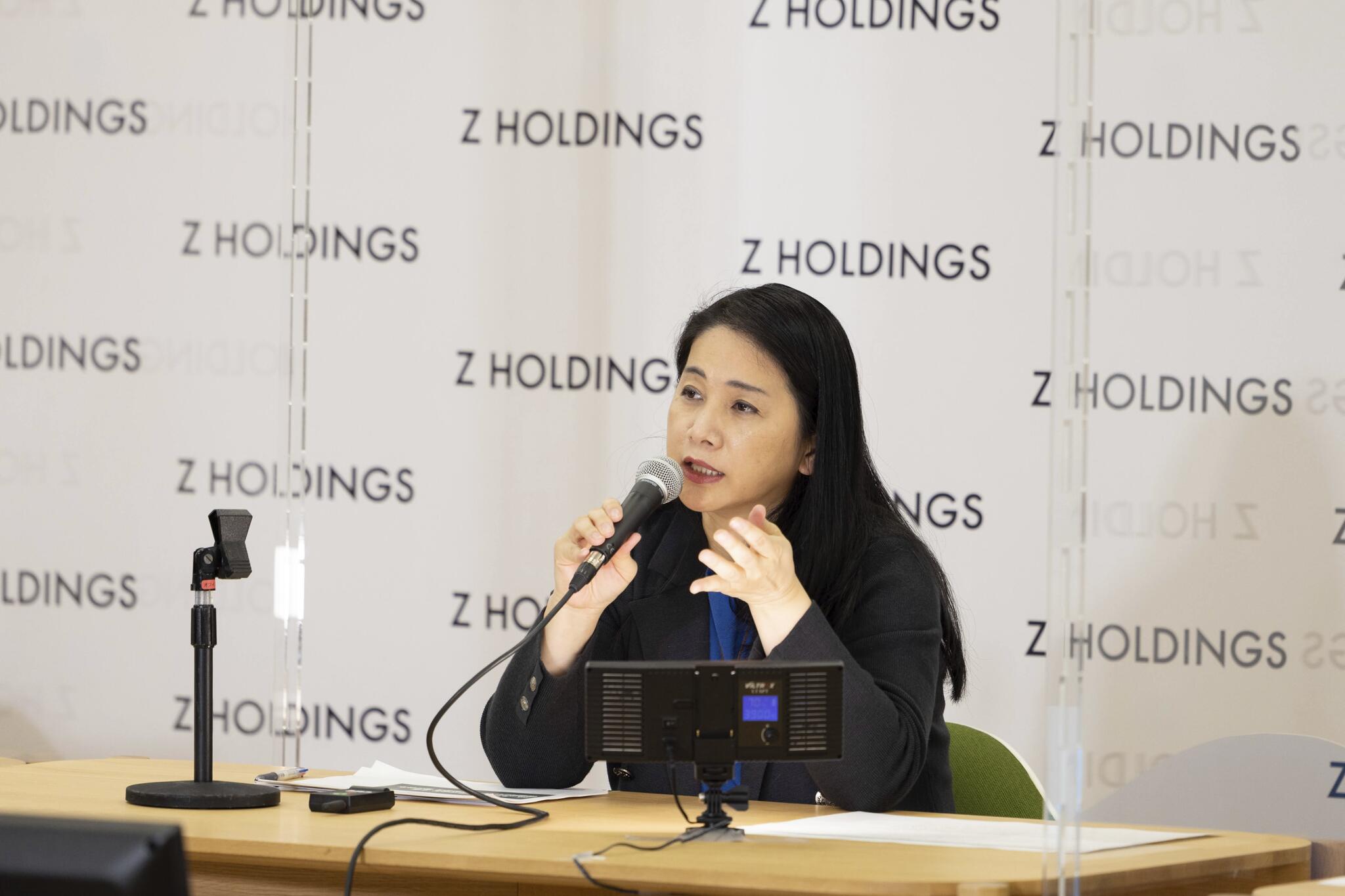
Ishihara has been involved in reskilling for three full years. She said, "The term 'reskilling' is now frequently mentioned in the media, and while I feel that awareness of the concept is growing, the excitement is actually only in the periphery, and there are still very few companies that are properly enforcing the concept."
Convenience stores and supermarkets are introducing unmanned cash registers, and ordering a delivery or hailing a cab can be done easily with a single smartphone app. While this aspect of "solving customer and social issues in an unprecedented way" is the impact of digital transformation, digital transformation can also unexpectedly rewrite the rules of the game, making digital transformation both an opportunity and a risk factor that can affect the survival of companies.
Ishihara said, "It is important to imagine when the X-Day will come for the company and to constantly have a sense of crisis." She added, "You cannot adapt to the times unless you have an understanding of digitalization," and emphasized that reskilling is important both to create value and to control crisis in the digital era.
The word "reskilling" means to reacquire or relearn a skill. It is defined as "acquiring and supporting others acquire the skills needed to enter a new profession or to adapt to significant changes in the skills needed in the current profession." Currently, the skills in this context often refer to skills involved in digitalization.
It is important to note that the subject of reskilling is not necessarily the employee, but can also be the manager, as it includes both acquiring skills and supporting others to acquire skills.
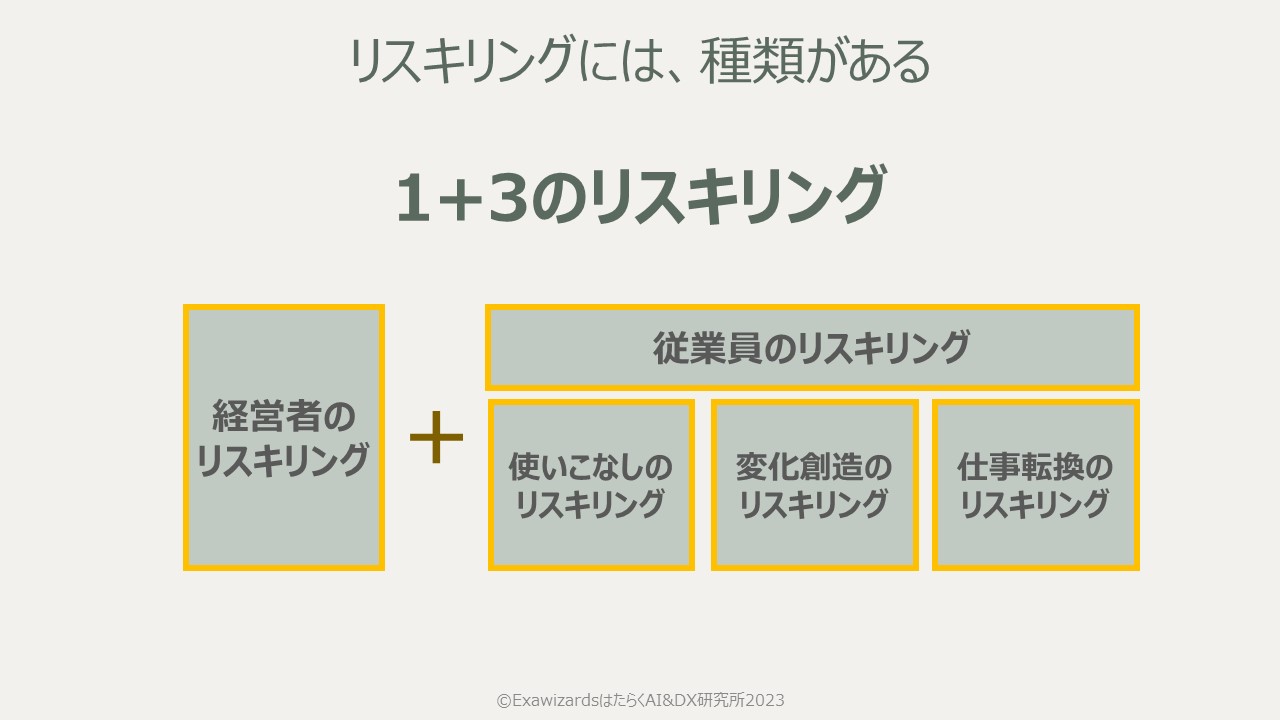
Ishihara says that there are two major types of reskilling: management reskilling and employee reskilling, and that management reskilling is particularly important. The reason for this, she says, is that digital transformation cannot proceed without management's will, and changing the mindset of employees is difficult without leadership. Ishihara emphasized, "If management itself updates its basic knowledge of digitalization, formulates a digital strategy, and shares its learnings, it will be able to promote change both within and outside of the company."
On the other hand, "employee reskilling" can be further classified into three categories: "reskilling for acquiring command," "reskilling for creating changes," and "reskilling for work transformation," with the most important of these being the second, "creating changes," Ishihara stressed.
"When employees are able to plan and promote their own digital solutions to problems, various changes will be driven by the frontline. By acquiring digital literacy through reskilling, and by having a perspective that allows them to talk about the issues at hand in a way that they can solve digitally, I believe that they will grow into people who can make changes on their own," Ishihara says.
A reskilling attitude to learn and understand technologies, techniques, and services that one does not know can be considered essential in the digital transformation era. Digitalization is only one means to an end, but it is useful for everyone, from the management to employees, and continued organizational reskilling may be the key to winning in the digital transformation era.
Of course, employees need to be mentally and temporally relaxed to continue reskilling in parallel with their daily work, and trial and error on how to create such a relaxed work environment is part of the process of reforming work styles. By raising digital literacy, visualizing information, and improving work efficiency, synergistic effects can be expected to smoothly promote reforms in work styles.
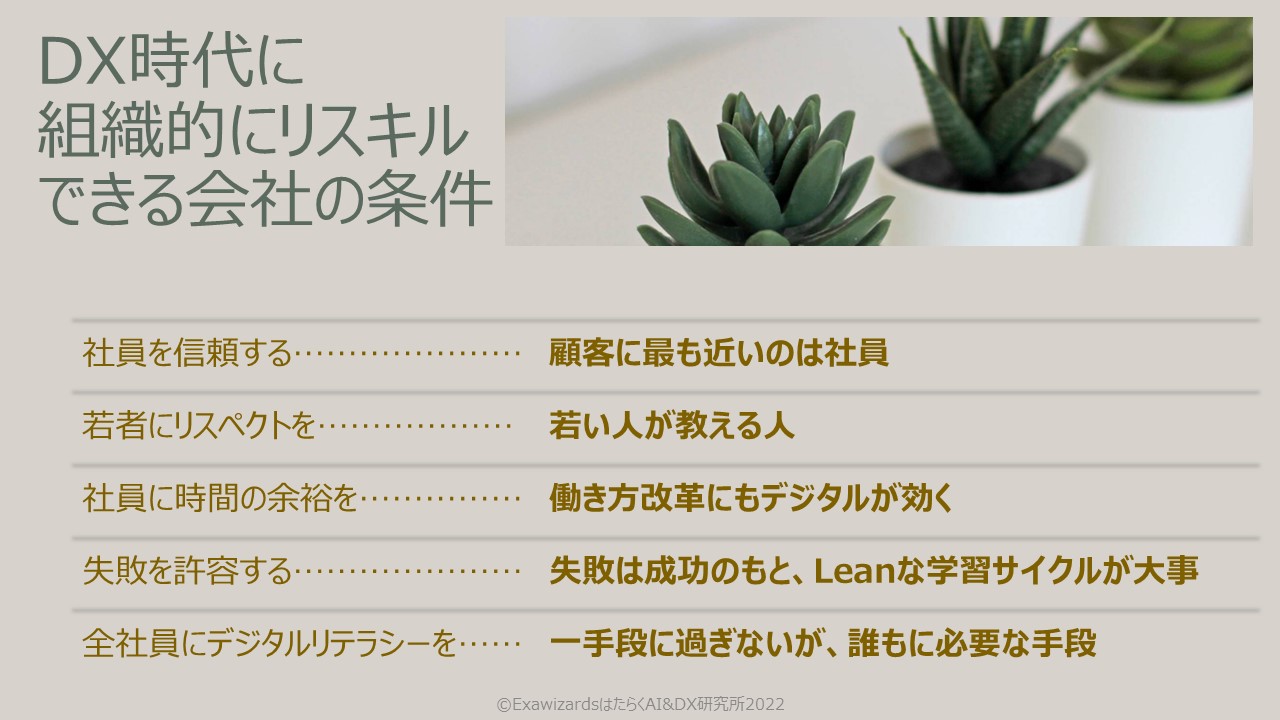
Ishihara listed five conditions for a company that can continue reskilling, including "trust in employees" and "respect for the younger generation." The first step to begin reskilling is to be aware that "all employees must be digitally literate."
Z Academia's Approach to Creating a Place That Can Quench the Employees' "Thirst"
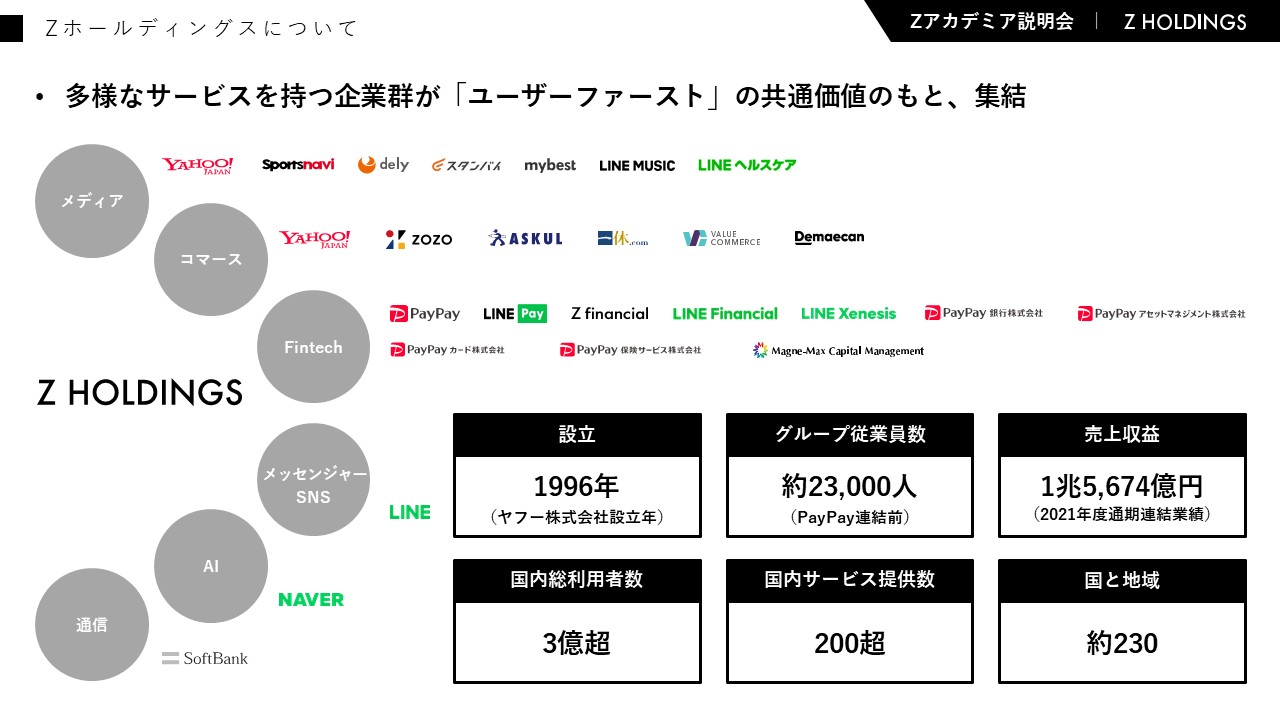
Z Holdings, the operator of the in-house university Z Academia, continues to provide learning opportunities to its employees for organizational reskilling. For a total of 12 years, Z Holdings has been providing re-learning opportunities for its employees, starting with its predecessor, Yahoo! JAPAN Academia which was established in 2014 within Yahoo Japan Corporation, the Z Holdings Group's core company.
One of Z Academia's strengths is its dynamic scale, with all Z Holdings Group employees eligible to take courses, as well as the fact that approximately 200 courses are offered annually based on the three needs of "learning, interacting, and communicating."
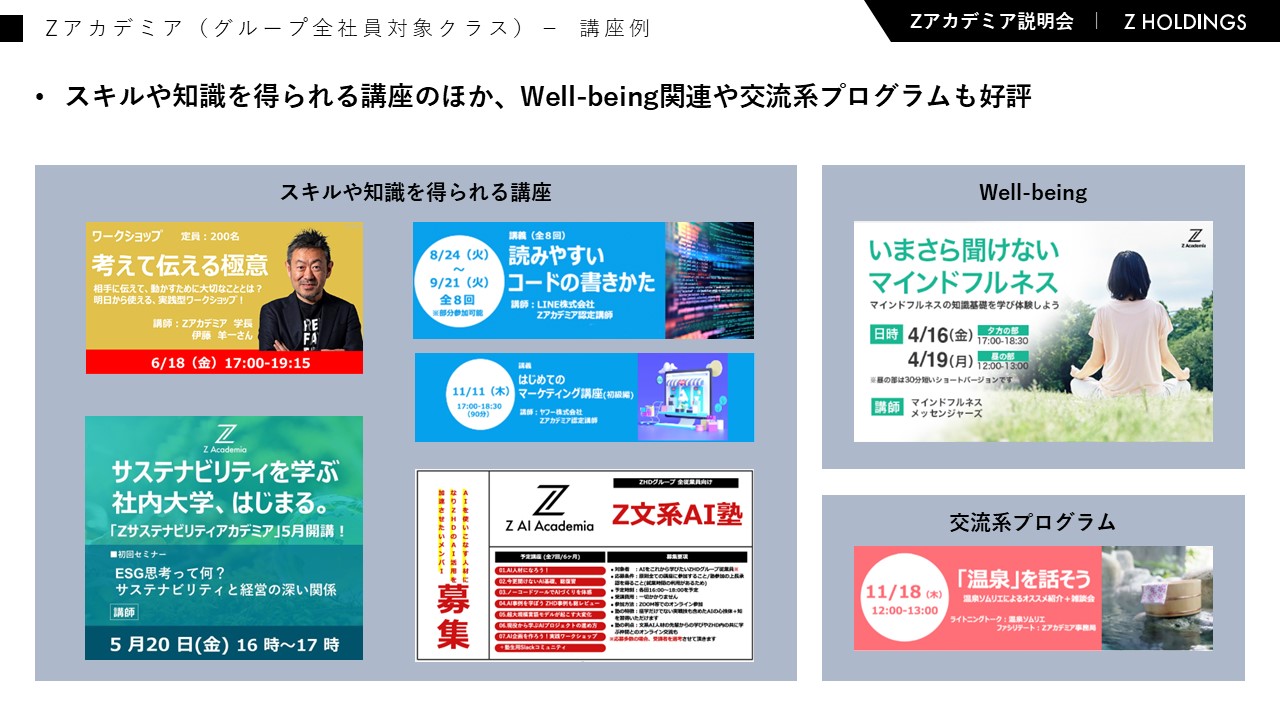
One of the key elements of Z Academia's dynamic and fulfilling nature is its certified instructor system, in which employees with specialized skills, including occasional writers, serve as lecturers. Z Academia can realize this system due to the diverse workforce of the Z Holdings Group, which is a corporate group that provides a variety of services. Also, the fact that 80% of the instructors are employees makes a rich variety of courses possible.
In FY2021, a cumulative total of 26,000 employees participated in Z Academia. Satisfaction levels remained high, averaging 8.4 out of 10, with the most popular courses being "courses to acquire skills," such as the AI human resource development program and code writing, and "courses to gain knowledge," such as the sustainability program.
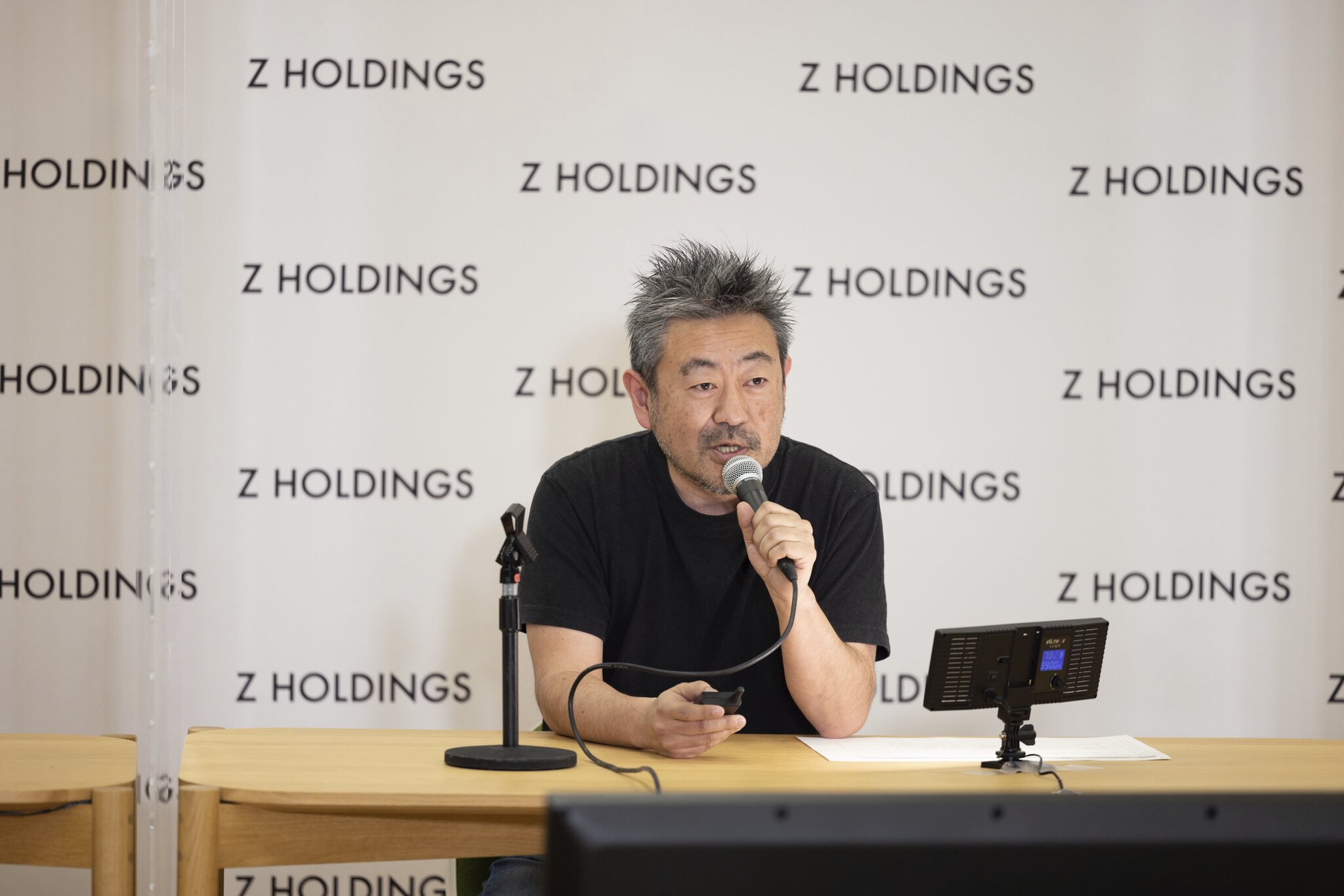
Yoichi Ito, President of Z Academia, believes that the key factor of Z Academia is "thirst." "Employees have the underlying 'thirst' of wanting to exercise their ability more in the company. The goal of Z Academia is to be a place that quenches this 'thirst' of employees. I believe that the optimal solution for Z Academia as a reskilling organization is the platform style, based on the three 'thirsts' that the employees have: 'Desire to learn,' 'Desire to interact,' and 'Desire to communicate'," he says.
Ito also talked about prospects, saying, "We would like to not only provide a place to learn, but also create a database of each participant's participation status and indicators, and incorporate a system to make recommendations based on this database."
Developing AI Talent Across the GroupーWhat is Z Humanities AI School?
In some cases, Z Academia has developed its popular courses into a practical format, the best example of which is Z Humanities AI School.
Z Humanities AI School is a six-month practical program established within Z AI Academia. Z Humanities AI School is a community launched in 2021 with the aim of fostering AI human resources across the Group, and is unique in that it targets non-engineering positions, including planning and back-office positions, where most of the employees have a humanities background.
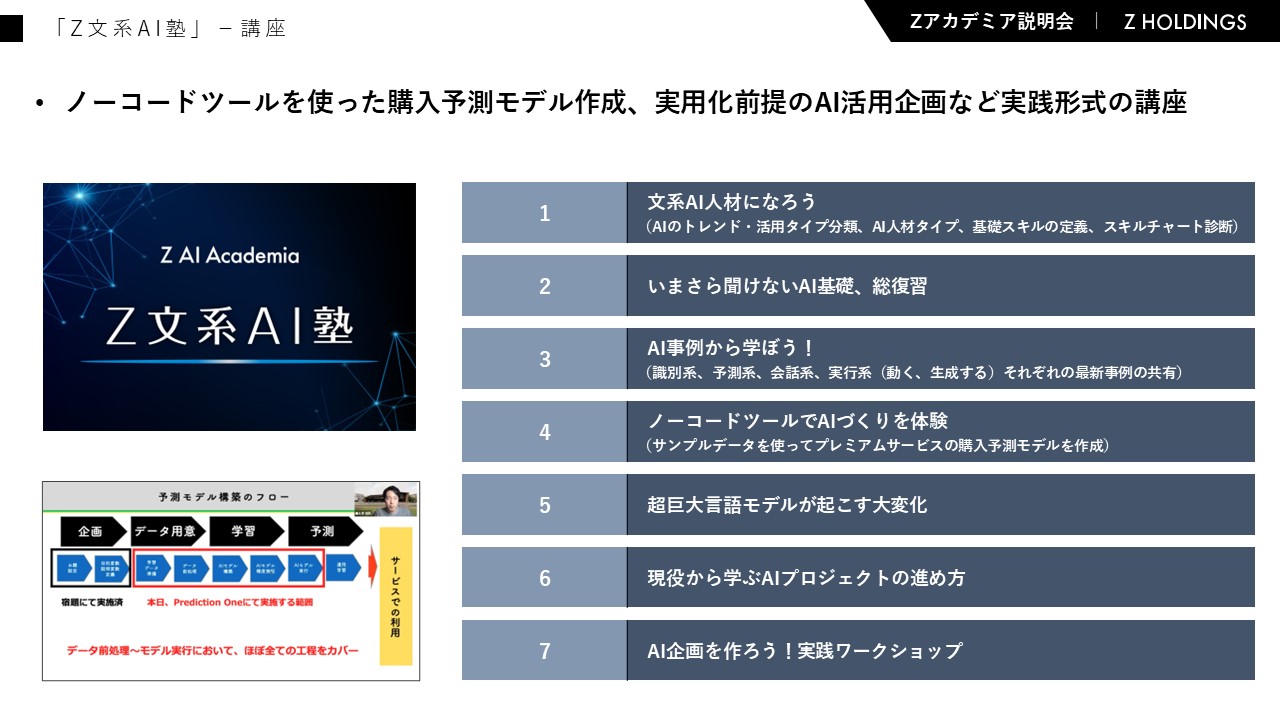
The program covers the basics and applications of AI, from classroom lectures on basic knowledge such as AI trends and classification of AI applications, to the creation of a purchase forecasting model using the no-code tool. A key feature of the program is that it also includes a workshop for planning AI applications for practical use, in which participants consider what classification of AI to use in order to solve business issues.
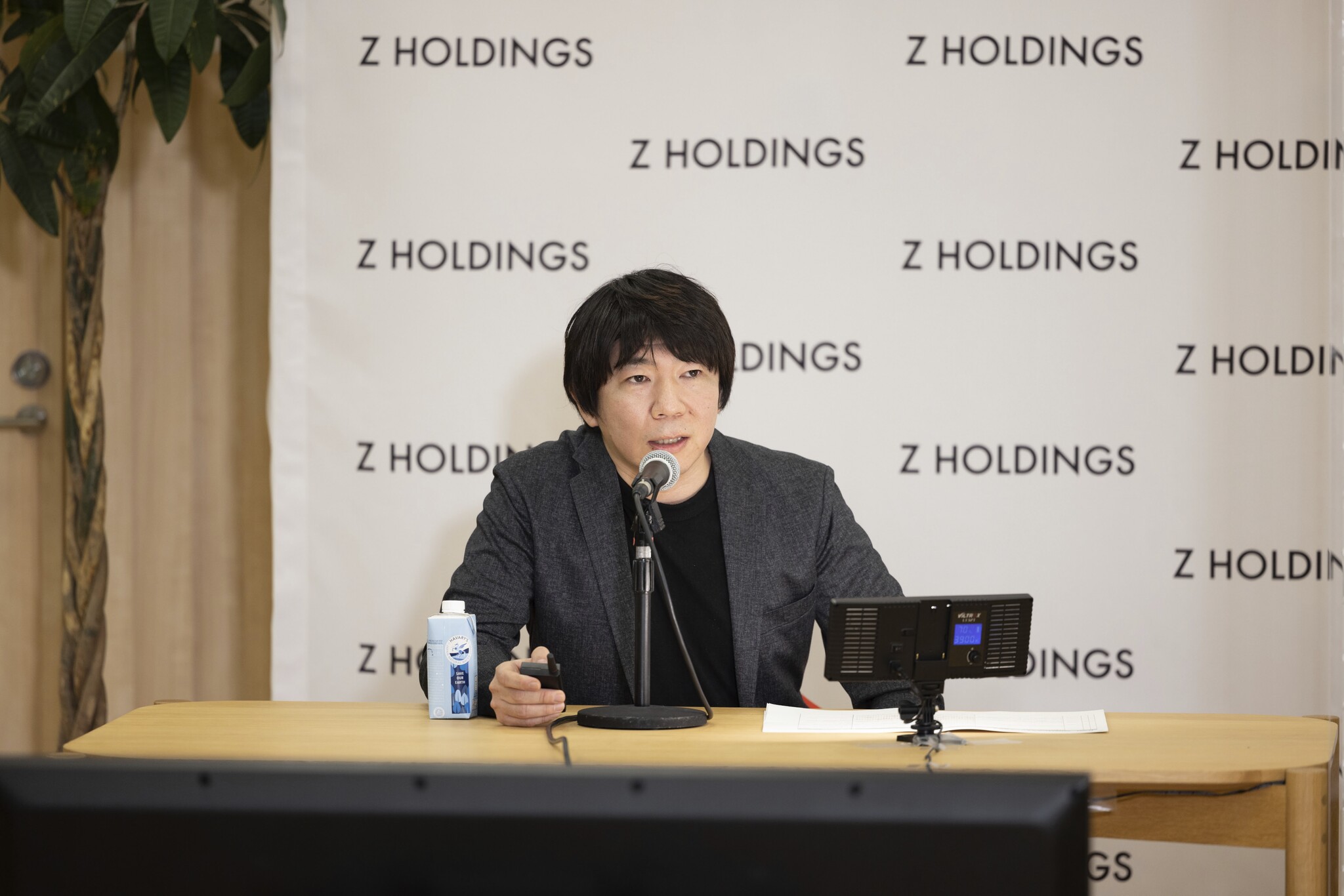
"We have actually begun to see cases where multiple departments, including back-office departments, are actively using the knowledge they learned in Z Humanities AI School to perform AI-related tasks," said Shinya Tabei, who directs Z AI Academia, pointing out the effectiveness of the AI human resource development.
In September 2022, Z Academia began accepting applications from participants outside of the Z Holdings Group, further expanding the circle of learning. Z Humanities AI School also opened its doors outside of the Group, and 34 participated in the second term in response. Tabei says, "We would like to invigorate the Z Humanities AI School through the sharing of various opinions and knowledge generated by the exchange of personnel from inside and outside the Group." He also expressed his vision for the future, saying, "We would like to create learning outcomes rich in diversity and evolve the Academia as a forum for learning and exchange."
In March 2021, when Z Holdings announced its business integration with LINE Corporation, the Company declared that it aims to become "the world's leading AI tech company from Japan and Asia." Please keep an eye on how Z Holdings will develop its corporate university, a main battlefield of reskilling, in the future.
Panel Discussion
A panel discussion was held with Ishihara and Ito based on a survey on reskilling conducted by Z Holdings in advance.
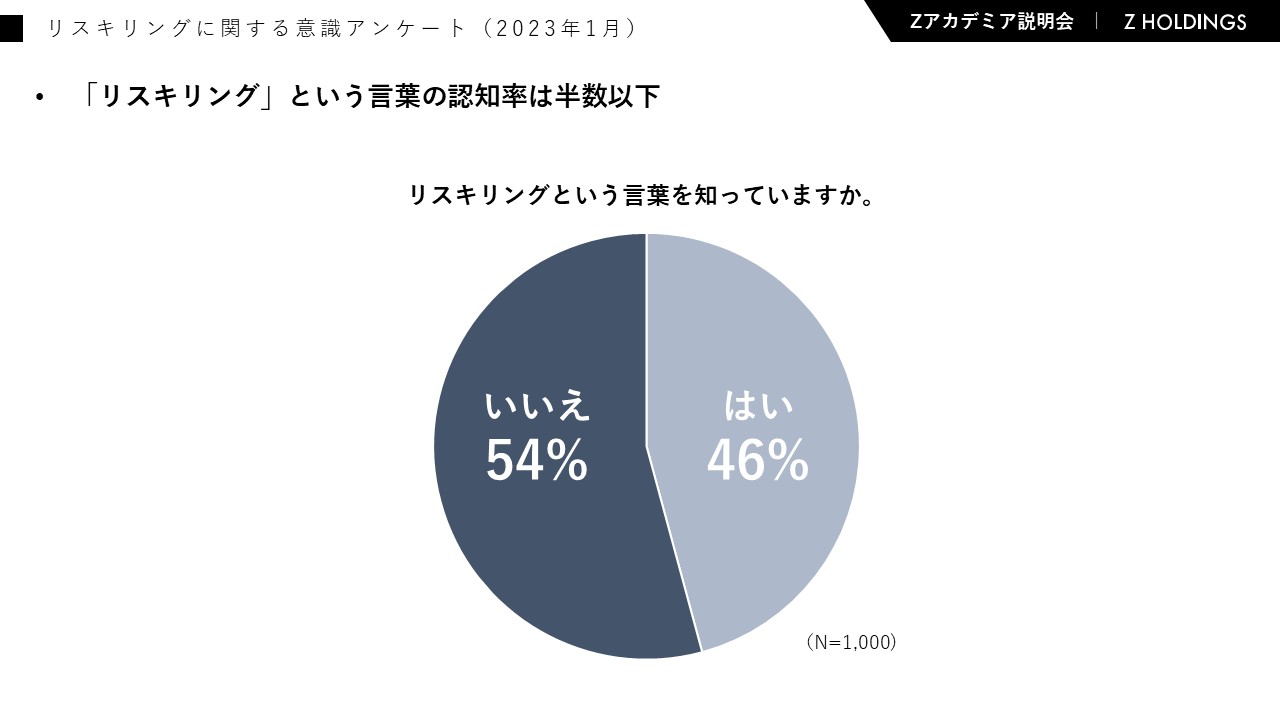
The first question, the recognition rate of the term "reskilling," was 46%. Less than half of the respondents were aware of the term itself.
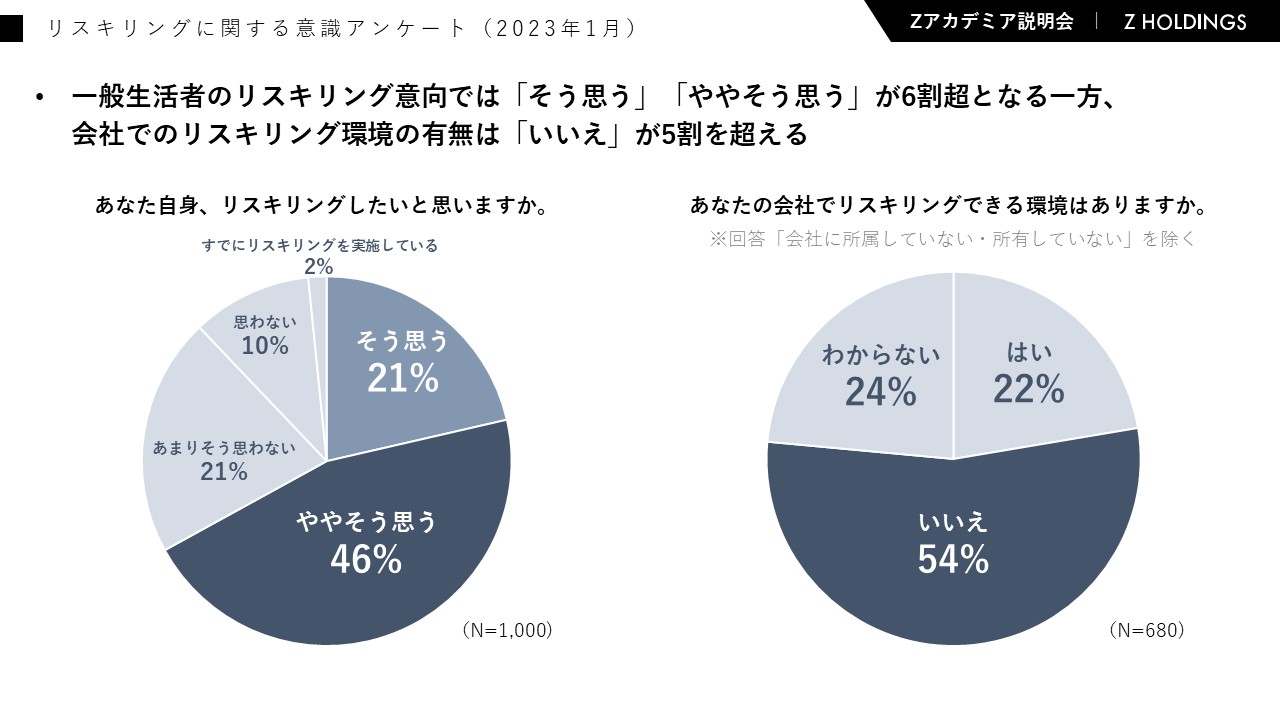
When asked if they would like to reskill, approximately two-thirds of the respondents answered, "Yes." When asked if there was an environment in which they could actually do so, 20% answered, "Yes."
――Q: What is your view on the term "reskilling" and the current trend?
Ishihara: Only a little less than 50% of the people surveyed had heard of "reskilling." But another survey conducted a year ago showed that the percentage was around 30%, so I think the awareness of the term reskilling itself is growing very rapidly. It seems that reskilling is becoming popular, but while the industry closely related to reskilling is thriving, the number of companies that provide employees with proper opportunities for reskilling is not increasing.
Ito: I have some doubts about the emphasis on the word "reskilling." The attitude of learning and continuing to learn must be a prerequisite to reskilling. Japanese companies do not invest much in learning, and employees have little awareness of the need to learn. I feel that this trend itself is fatal. No professional baseball player would compete in a game without swinging his/her bat, and no golfer would compete without practicing his/her approach. This is not limited to the world of sports; it is the same in the business world.
As Ishihara-san said earlier, it is precisely because we are in the era of digital transformation that reskilling in the narrow sense of "relearning" is becoming more important. Digital transformation is not only about digitalization, but also about management transformation that lies ahead of digitalization. When I heard Ishihara-san's talk, I felt once again that it is not enough to just learn programming, but that the management must first learn how to make transformations.
――Q. What did you think of the results of the survey?
Ito: I thought we should act more proactively, not just say, "I somewhat agree that I would like to reskill." I would like to strongly ask companies, "Is that enough to win?" In order to survive in a rapidly changing world, we really need to provide reskilling programs.
Ishihara: I don't think that reskilling is a question of whether or not to implement a reskilling program. I think that there are no other options but to provide a reskilling program. As for those who say that they do not know how to proceed with reskilling or that it has not been effective in the business field, I think it is because there was no clear strategy. I think we need to go back to the basics of developing human resources to win in business.
――Q: Summarizing what you have said so far, how do you think companies should deal with reskilling?
Ito: Based on the basic premise that it is vital for companies to promote reskilling to win, Z Academia aims to "unleash the talent and passion" of each and every employee. As a company, we explicitly express this aim. At the same time, we would like to continuously question each and every employee, "What is the value in your life?"
Ishihara: Z Holdings has long been a company that has clearly set forth its corporate intention with the slogan "Unleash the talent and passion," so whether it is Z Academia or the Z Humanities AI School, I think there is a unity of intent. In that sense, I feel there is a very high level of consistency and quality. On the other hand, I think there are still companies that do not invest much in employee learning. I think there is a great need for companies to create an environment to recognize what skills employees need to acquire and how they can acquire them.
What Are Z Academia's Strengths and Future Plans?
Showing the growing public interest in reskilling, many members of the media attended this session. A Q & A session was held at the end. Reporters interested in Z Academia, which practices reskilling, asked questions one after another, and the speakers answered them sincerely. One reporter asked, "How does Z Academia create the curriculum of 200 courses? Are they all created internally?" Tabei responded, "When Z Academia was launched, the secretariat planned the content of lectures and invited lecturers on a case-by-case basis. This way, we could only hold about 2 to 30 lectures per year. When we launched the certified instructor system and recruited employees to give lectures within the Group, we soon attracted more than 20 lecturers and were able to open many more courses. In addition to training courses, we are also making efforts to create more casual opportunities such as lunch hours for information sharing."
On the other hand, when asked how he would like to strengthen Z Academia in the future, Ito replied, "As a platform, we have established a system to provide a variety of contents. Now that the flow of people gathering, teaching, and interacting with each other has been established, the next issue is what Z Holdings wants to do with this outcome." He said that he would like to create a flow that is not only limited to learning, but would want to synchronize it with management strategies in the future.
At Z Holdings, Z Academia will continue to serve as a platform for the management and employees to face and update reskilling from the same viewpoints.
AI-Related Courses Thrive in In-House University "Z Academia" ― What Were the Take-Aways from Z Humanities AI School?
https://www.z-holdings.co.jp/en/strategy/09/
The Key to Developing Sustainability-Minded Personnel: The Purpose and Vision of the Z Holdings Group's In-House University "Z Sustainability Academia"
https://www.z-holdings.co.jp/en/strategy/12/
- Date of interview: January 27, 2023 Article published: February 13, 2023
(This article is based on a reskilling briefing for the press held by Z Holdings Corporation on January 27, 2023.)
Affiliations and titles in the article are as of the date of the interview.
Interview/article by Satoko Ishikawa
Edited by Dellows
Please note that the English translation is provided for reference only. The original, official article is in Japanese.